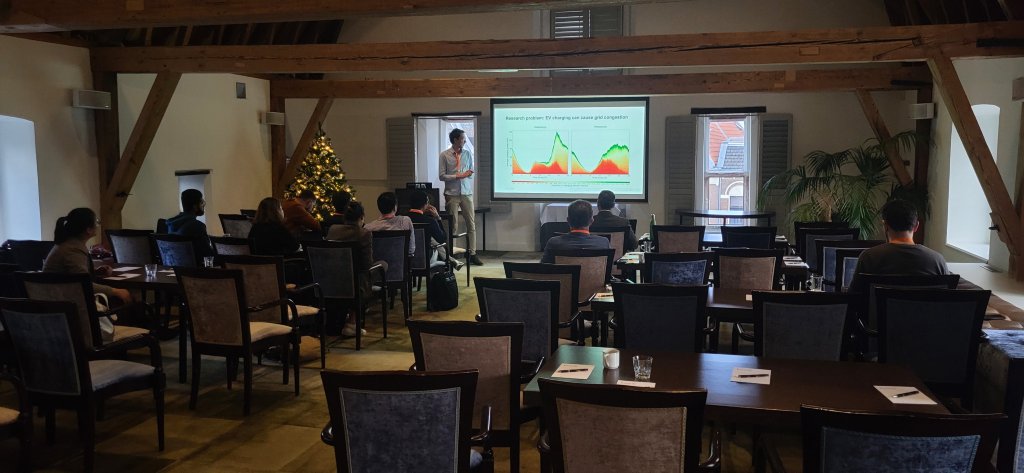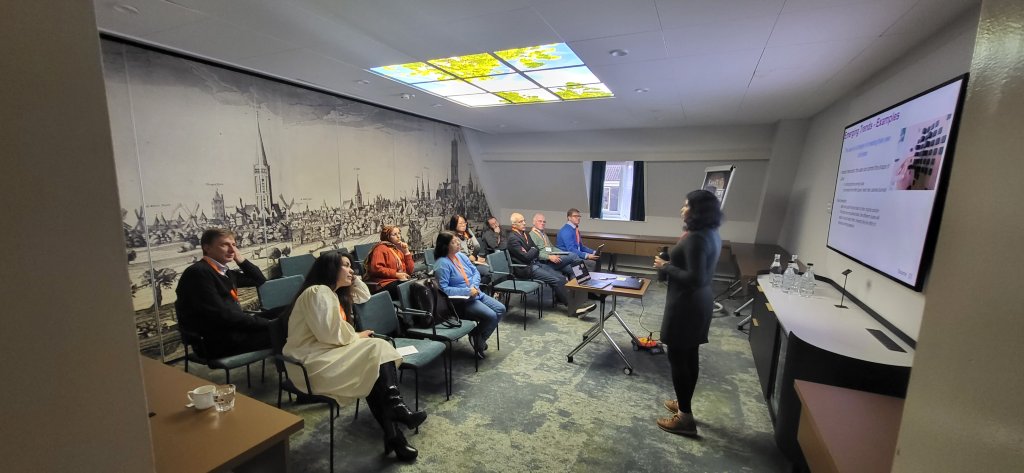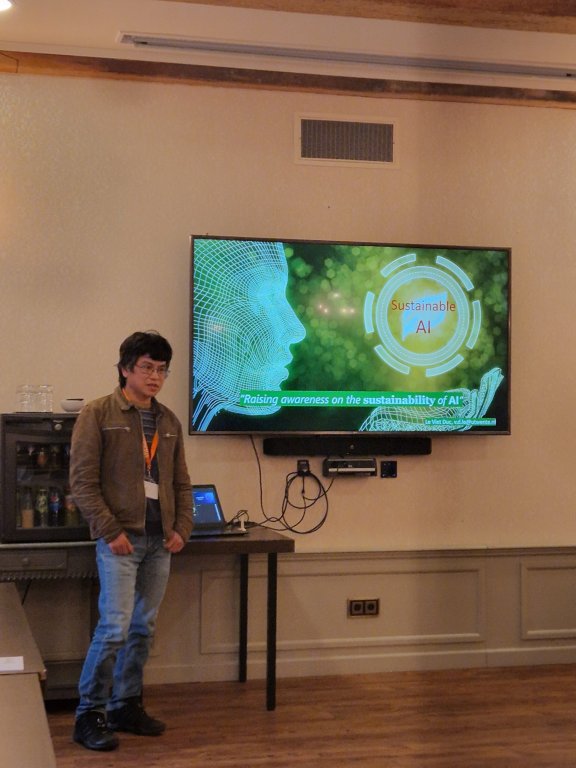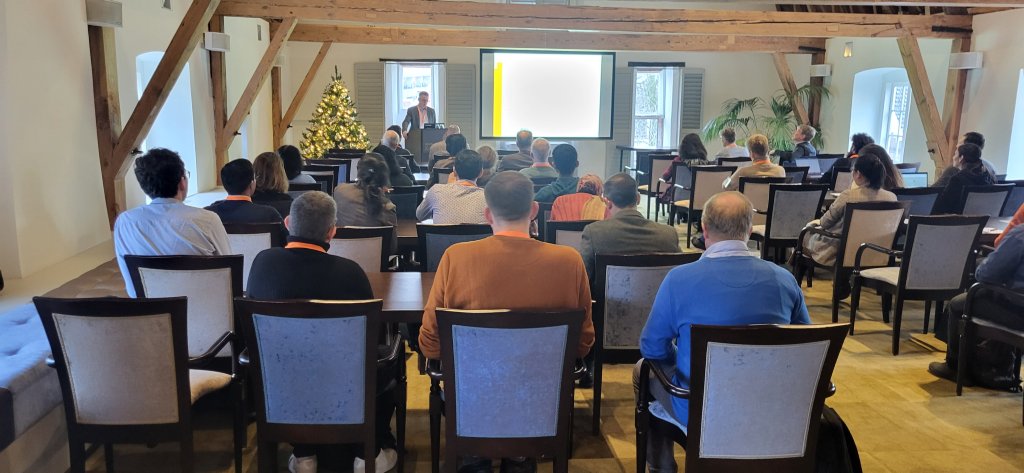On December 13, 2023, our annual Community Day took place at Grand Hotel Karel V in Utrecht with the participation of about 50 researchers. The day started with a networking lunch followed by a short presentation by Mark van den Brand (TU/e) and Suzan Bayhan (UT). Topics covered during the presentation included NIRICT's focus and mission, some of the major accomplishments of the past year and the structure of the Community Day.
As the themes of 2022 attracted a lot of interest and are still highly relevant, we had the same themes this year with the addition of the Sustainable ICT theme. All themes are related to the societal challenges we are currently facing and require interdisciplinary effort to be addressed effectively.
Breakout sessions
After the plenary session, the group was divided into three according to the themes of the day: Energy and ICT, Health and ICT, Agriculture and ICT and Sustainable ICT. The themes Agriculture & ICT and Sustainable ICT were merged.
First breakout sessions consisted of pitches by the researchers. To sharpen the intended output, we kindly requested each speaker to provide some answers/perspectives on the following questions or (a subset of them):
- What is the major societal challenge this research area aims at solving?
- What are the key research questions in this area?
- What are the emerging trends toward solving these challenges?
- How can ICT (EE+CS) contribute to solving these challenges?
With the help of the pitches, discussions were stimulated and during the second breakout sessions the most pressing issues and research areas per theme (and in NIRICT’s scope) were identified.
Energy & ICT Session
With the participation of 15 researchers, the Energy and ICT parallel session, chaired by Tarek Alskaif (WUR), hosted six pitches delivered by Aihui Fu and Pedro P Vergara (TU Delft), Nico Brinkel (UU), Nataly Banol Arias, Elham Shirazi and Aditya Pappu (UT). The pitches covered various topics, such as the role of Information and Communication Technologies (ICT) in energy management in the built environment, electric vehicle charging, power electronics and energy networks. The pitches were followed by an interactive discussion and the participants agreed that grid congestion and capacity management are among the most pressing challenges that are facing the electricity system. Electricity grid resilience to cyber-physical threats as well as end-user engagement are also identified among the pressing problems. Digital twins, with real-time monitoring and control, data-driven decision making and user interaction, received special attention in the session and are seen as an opportunity offered by ICT to support optimal operation and planning of the future electricity grid. The participants discussed that ICT has its own challenges in this domain, such as secure communication protocols, interoperability, cybersecurity, data privacy and human-machine interaction. They also pointed out to the need for systems thinking and collaboration among researchers from different disciplines to develop technical solutions and to ensure acceptance by the public and private parties to adapt to the changes.

Health & ICT session
The session Health & ICT chaired by Justin Dauwels (TU Delft), hosted 4 pitches delivered by Champika Epa Ranasinghe (UT, 2 pitches), Frank Broz (TU Delft) and Przemyslaw Pawelczak (TU Delft). The pitches covered various topics; Tangible & Embodied Interventions for Prevention and Reduction of Non-communicable Diseases (NCDs), Let’s Get Kids Back to Physical, Socially Assistive Human-Robot Interaction and Intraoral sensing.
In the latter part of the session, participants engaged in a robust discussion on various facets of ICT & healthcare. The discourse culminated in the identification of key opportunities presented by ICT in healthcare, including Tangible and Embodied Interaction (TEI), sensing & actuation (e.g., nanosensors), edge computing (edge AI, tinyML, computing infrastructure, etc.), designing experiential futures, lifestyle and behavior modification, and socially interactive robots. Additionally, personalized socially assistive robots emerged as a significant area of exploration. However, the discussion also brought to light major challenges within the field, including the need for domain expertise (e.g., physiology, healthcare processes), explainability and interpretability of models, security of edge devices, and the design of novel sensors for medical applications (chemical sensors, biological sensors, physiological, etc.).
To adequately prepare future engineers for advancements in this research and development domain, the consensus among participants emphasized the necessity of a multidisciplinary and interdisciplinary education. This education should prioritize holistic healthcare systems engineering, providing a well-rounded foundation for addressing the complexities and innovations in the intersection of health and ICT. 
Sustainable ICT and Agriculture & ICT session:
Three pitches were delivered in the merged Sustainable ICT and Agriculture session, all dealing with different aspects of the intersection between ICT and sustainability. Sjaak Wolfert (WUR) identified the major challenges and solutions offered by ICT in making food production more sustainable. Przemysław Pawełczak (TUD) stressed the need for investments in fundamental research on making computers and communication systems sustainable throughout their lifecycle. Le Viet Duc (UT) focused on the issues being raised by the proliferation of AI/ML systems across the digital landscape and identified distribution/decentralization of these systems as a possible solution to these issues. The session participants, chaired by Vasilios Andrikopoulos (RUG) then proceeded to discuss opportunities offered by existing works towards interoperability, data provenance, carbon footprint awareness, and energy optimization across the abstraction levels. Major challenges in system and data integration, accountability for emissions, avoiding redundancies in edge computations, reduction of emissions through specialized and/or less hardware, and providing interpretable and explainable AI solutions towards addressing the wider category of sustainable development goals (SDGs) were discussed next. The need of interdisciplinarity in addressing these challenges was identified as a major requirement for future work.

Conclusion and follow up
We look back on a successful Community Day with enthusiastic participants, a lot of young researchers, fruitful discussions, and many good ideas. Some of the discussions will continue during the 4TU.Energy Community Day on April 16th, 2024, and follow-up collaborations are currently being prepared with 4TU.Energy and 4TU.Health. A joint call with 4TU.Energy will be distributed in early February. The aim of this call is to support all activities that help in strengthening the collaboration between these communities and enable them to start-up new research ventures by using this funding.
We are also exploring opportunities for a joint workshop with 4TU.Health later this year and of course there will be a 4TU.NIRICT Community Day in 2024, probably around October.




